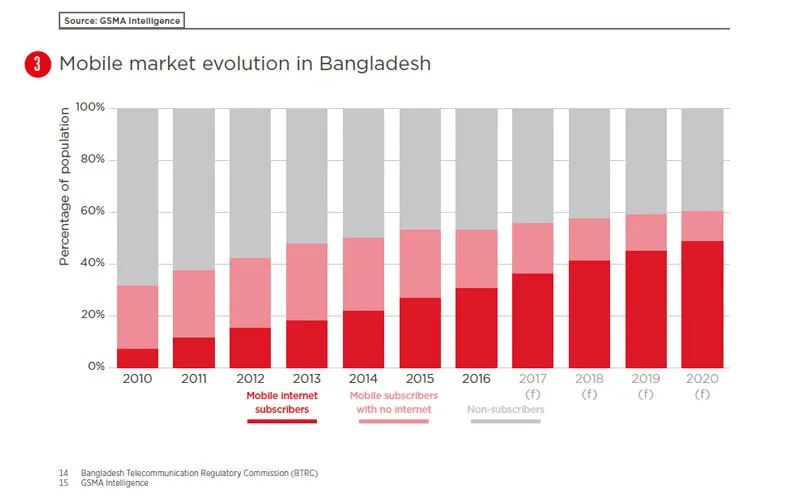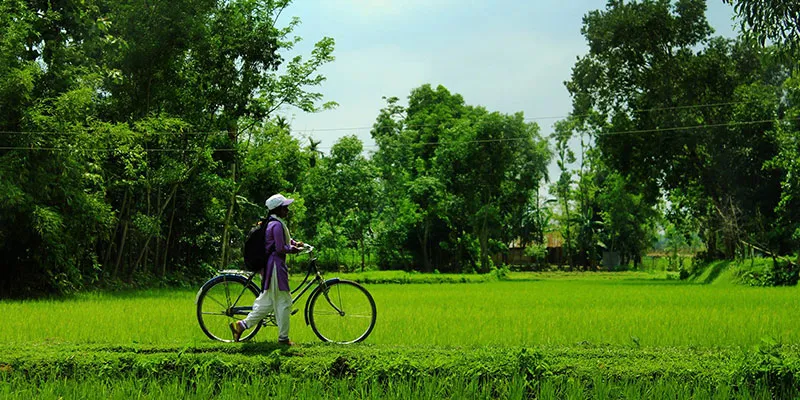8 unique projects from Bangladesh using mobile technologies to achieve the United Nations Sustainable Development Goals
Highlights from a report by global mobile industry body GSMA, on the positive impact of mobile technologies in Bangladesh. These unique projects are helping the country achieve U.N. SDGs and Bangladesh government’s Vision 2021.
Mobile industry body GSMA has released a report titled, ‘Bangladesh: Driving mobile-enabled digital transformation’, that highlights the mobile industry’s unique position to play a critical role in achieving both the Bangladeshi government’s Vision 2021 development roadmap and the United Nations Sustainable Development Goals (SDGs). Vision 2021 is the Bangladeshi government’s roadmap for Bangladesh to become a middle-income country where poverty will be completely eradicated by 2021 – the 50th year anniversary of Bangladesh’s independence. One of the components of Vision 2021 is Digital Bangladesh, which aims to bring socio-economic transformation through information and communication technologies.

The report showcases case studies of unique projects in Bangladesh that have played a role in expanding digital access, digitise education, healthcare, agriculture, e-delivery of government services and promote gender inclusion:
Grameenphone WowBox: Grameenphone offers the digital service, WowBox – a lifestyle app that can be browsed without any data charges. This app also offers customers 20 MB of free data each week. In addition to browsing the content offered in the app (which includes daily news updates, lifestyle tips, games, sports, horoscopes, jokes and competitions), users can earn tokens (reward points) to spend on internet offers.
Robi Internet4U: To bridge the awareness gap among young people of the benefits of the internet, Robi launched Internet4U – a campaign for college and university students across the country, teaching them “proper and safe” use of the internet as a tool for networking, learning and development. Through interactive sessions and live demonstrations, students are shown the power of the internet as a tool for self-education, skills development and employment. Around 5,000 people were targeted in this campaign.
Infolady: The Infolady initiative is driving mobile internet adoption and use in Bangladesh. iSocial, short for Infolady Social Enterprise Limited, is a model for empowering communities through female entrepreneurship. Developed by Dnet in 2004, the Infolady model is a “women-for-women” family-based “infopreneurship” model, where a female entrepreneur equipped with ICT devices travels around villages on a bicycle, and facilitates well-being of the marginalised through creation of informed choices. The women are empowered as entrepreneurs by charging for performing digital services for communities, also giving the programme a sustainable business model. The model created more than 100 women entrepreneurs in Bangladesh in four different pilot phases. The Infolady model served more than 450,000 rural citizens between 2011 and 2015.

Grameenphone Tonic: Bangladesh Telenor Health launched its first mobile health service, Tonic, in Bangladesh in June 2016, through Telenor’s local operator Grameenphone. Tonic is a health and wellness platform that provides digital health services, such as preventative advice content, appointment booking, phone-based access to primary care, discounts on health tests and specialist care, and insurance in the event of hospitalisation. Users can choose between three packages: Tonic Premium (BDT298 or $3.6 per month); Tonic Advanced (BDT128 or $1.6 per month); or Tonic Basic (pay per call for primary care consultations, otherwise free). As of the end of 2016 there were two million users.
Robi Shikkharthi: This service is an SMS, interactive voice response (IVR) and WAP/web-based educational service that disseminates educational information content (such as vocabulary, grammar rules and general knowledge). Examples of content include education tips, learning courses, public exam advice and schedules for exams.
Banglalink education initiatives: Banglalink has launched three education services – Education Portal, MegaMind and MEDU. Through the Education Portal, customers can access information on SSC, HSC, university admission test preparation, general knowledge, English learning related preparation and exam queries. The daily subscription fee is BDT0.20/day ($0.0024/day). MegaMind is an m-learning solution that uses SMS and IVR to provide knowledge to subscribers. The monthly subscription to the services costs BDT0.25 ($0.003). Meanwhile, MEDU provides general knowledge, exam tips and career counselling via SMS, IVR and WAP.
Krishi Radio: Krishi Radio is an IVR-based service for farmers. Users can receive IVR and OBD content related to Krishi Bishesh Buletin, Chashabader Upodesh, Abohawar Khobor, Shofol Krishok/Krishanir Shakkhatkar and Krishi Binodon. The services provide agricultural news, advice, weather updates, knowledge sharing and entertainment.
Digital services for land: a2i in collaboration with the Cabinet Division, Ministry of Land and land-related agencies, is working on ensuring prompt, reliable and high-quality land services for the underserved. In particular, the digital system will allow access to land records electronically at Digital Centres, changing records of rights digitally, electronic inheritance management, electronic deed registration, electronic payment of land-related service charges (including land revenues), and the digitisation of public land management and urban land leasing. These initiatives are being integrated into the a2i Land Information and Services Framework (LISF).
The report highlights the opportunity for the government and the mobile industry to work together to unlock digital transformation for millions of Bangladeshis, and identifies seven areas in which collaboration could accelerate impact, including closing digital access and gender gaps, increasing digital literacy and improving health outcomes and financial inclusion.







